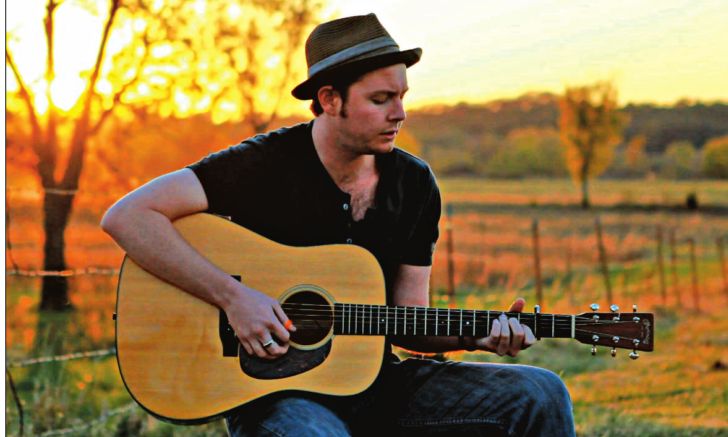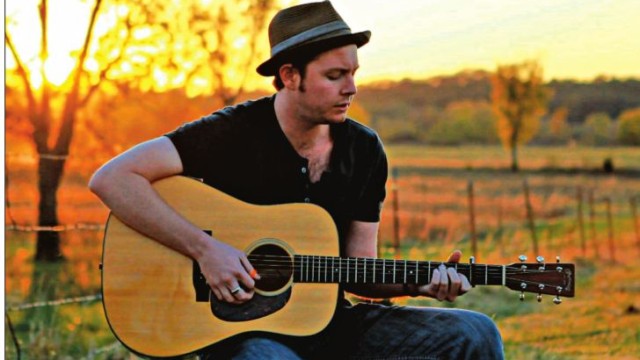By Jim Morrison
The last time John Fullbright was in Norfolk, five years ago, he played a private house concert in a garage for about 80 people.
To say his career has taken off since then would be like saying Bob Dylan has written some pretty good songs.
In 2012, Fullbright, then 24, self-released his studio debut, “From the Ground Up.” Among fans of great songwriting, it quickly found devotees. NPR called him an “Artist You Should Know,” comparing him to Townes Van Zandt and Randy Newman. The Wall Street Journal, The Los Angeles Times, The New York Times, and other heavy hitter extolled his talent.
Then his little record earned a Grammy nomination for Best Americana album. The other nominees? Bonnie Raitt, The Avett Brothers, The Lumineers, and Mumford & Sons. Not bad company.
How did that Grammy nod happen?
“I think about that all the time,” Fullbright says on a call from his grandparents’ house near Okemah, Oklahoma, where he lives part of the time. “I still can’t come up with why or how that came to be.”
Fullbright will be the headliner for the Sea Level Singer/Songwriter Festival on April 2 at The Roper Performing Arts Center in downtown Norfolk. The festival benefits Tidewater Arts Outreach (TAO), an organization that arranges for local musicians to play for people in assisted living homes and other places who can’t get out to hear music.
Fullbright attended high school in Okemah. If the name sounds familiar, it’s the birthplace of Woody Guthrie. Though Fullbright grew up near there, and not right in the small town, media outlets nonetheless seized on the connection.
When he last played in Norfolk, a crowd member called for a Woody song. “Woody who?” he joked. “That hack.” He explained he didn’t know who Guthrie was until he was almost out of high school and came to him through Bob Dylan, the way so many people do. The only picture in his high school was of Larry Coker, the former University of Miami football coach. Not Woody.
Fullbright’s second album, the cleverly-named, “Songs,” came forth in 2014 and earned more plaudits. The disc represented Fullbright’s maturing and challenging himself to go deeper. The years after the Grammy nod, he notes, were not always easy.
“It’s been strange, kind of difficult at times,” he adds, “but I’m pretty satisfied with the whole thing. I just didn’t expect any of it. It all just happened quick. ”
He still seems surprised to be playing alongside artist he’s a fan of. Miranda Lambert, Blake Shelton, Ashley Monroe, and Jimmy LaFave, among others, are fans. Songwriters like Kevin Welch and Sam Baker, who he played with the first time he was in Norfolk in 2010, are good friends.
Recently, he opened and then played Guthrie’s “Deportee (Plane Wreck at Los Gatos with Steve Earle. “It was a full circle kind of thing for me,” he says. “He was a really big deal. That seems to happen now. I’m in the green room with guys I hold in such high regard from when I was learning to write songs. It’s really a strange feeling. I have to stop sometimes and say if I could go back in time and show this snapshot to a 16-year-old version of myself, I don’t know how I would handle it.”
He didn’t know he was going to be on the road for so long and so hard. He’s happy to have cut back in the past year, splitting his time between the country house and a small apartment in Tulsa. “All the adulation and stuff, I just didn’t expect. I appreciate it, but it’s been kind of a learning process how to handle that stuff,” he says. “I’ve been a very shy person and I think having to learn how to not be a shy person was a little bit of a big step.”
Growing up in Oklahoma, there were two outlets — “play football or good luck,” he says — so he took up music. There was always a piano at home. His mother knew chopsticks, but not much more. So he taught himself, then started lessons at nine that lasted eight years because his mother would not let him quit. It was a very religious household. His mother listened to pipe organ Gospel music. “The worst kind of Gospel music,” he says. “Drove me nuts. No words.”
He was into rock and roll and eventually got into Gospel through Mississippi John Hurt and the Elvis Gospel record.
When it’s suggested some of his songs sound a little like hymns, he demurs. “I don’t know why,” he says. “I didn’t grow up with Gospel. I hated Gospel.
Fullbright grew up playing in small bars and restaurants around his town, sometimes for up to four hours at a time, however long his voice lasted. But he says he’s still had to learn how to tell a joke on stage and how to play a set and then drive three hours after the show.
He’s also shifted his artistic view. “I feel like I probably have something to say now whereas then I just kind of drank from other artists’ cup, which I still do, but it seems like I have a lot more to say as an individual than I used to,” he says.
Fullbright is a scholar of songwriting. Talk about yodeling in a song and he will name a Mickey Newbury track. Talk about Townes and he has his favorites. On down the songwriting lineage. “I’ve never been scholarly about anything except songwriting,” he says. “I really studied technique and different approaches and stuff. You can do down that rabbit hole a little too far at times. It can almost get stale. Hopefully, I haven’t gone too far. I’m an athlete instead of a sports historian.”
One songwriter he says he returns to again and again is Jackson Browne, particularly “Late for the Sky.” “I kind of obsess about a record for a long time and try to learn all the tricks and the sounds and the grooves form it. Hopefully, later on I try to use it.”
His go-to records for listening are the Stax and Muscle Shoals stuff.
For “Songs,” Fullbright changed things up a bit. He says he often writes songs that he can’t sing night after night. “There’s an urgency I really like on tape,” he admits. So he tried to write melodically smarter and more economical.
He also challenged himself to go deeper, to find the truth. If he’s telling a story, he relies on his imagination. But when he’s saying something specific and personal, he works to be open and tell the truth.
“Saying what you mean, meaning what you say. That whole thing,” he says. “Telling the whole truth instead of telling some of the truth, then relying on artistic license to get you the rest of the way. It’s really hard to do, but it’s really gratifying to be able to say I’m not going to pussyfoot around. This is actually what I mean.”
Why the change? “Touring. Singing the same songs night after night it may be fresh to the audience, but it’s certainly now fresh to me. If you’re going to sing a song over and over and over, presumably for the rest of your life, you need to say something with a lot of meaning,” he says. “Try to tell the whole truth. Truth never changes, never goes out of style.”
The catalyst for the change was “Very First Time,” the last cut on “Songs.” It’s an unabashed love song.
He sings:
Don’t answer the phone
Don’t answer the door
Pretend nobody lives around here anymore
No need to get up
I brought the wine
And I feel alright
For the very first time
And I believe I’m protected
By the things I can’t see
I don’t believe in Jesus
I’m told he believes in me
And I think that’s good
Cause it’s a long hard climb
And I feel alright
For the very first time
Fullbright isn’t afraid to be happy on “Songs.” The opening cut, “Happy,” asks “Tell me what’s so bad about happy” noting the usual songwriters default to sad. “It’s very easy to write that pity party song,” he says, “because then you get a lot of sympathy. I’ve done that. I’ll probably do that forever. I’m conscious of that now. What that actually is and what it means and what I get out of it. It’s less appealing now than it used to be.”
So is he maybe happier these days?
“Guaranteed,” he shoots back.
WANT TO GO?
Sea Level Singer/Songwriter Festival
April 2
TCC Roper Center
For tickets, go to http://www.tccropercenter.org/events/event/122-sea-level-fest-presents-john-fullbright





